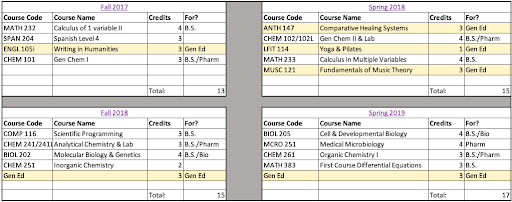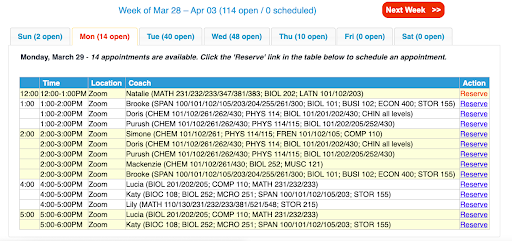Tackling Carolina Science
By Mackenzie, a UNC Senior and Peer Tutor
When I first came to Carolina, I wasn’t sure what I wanted to major in, but I knew I was pre-pharmacy and so I signed up for CHEM 101 my first semester, along with other courses that piqued my interest. After a few bumps in the road and many nights of doubt, I finally settled on a Chemistry B.S. as my degree and started my planning. As I begin my final semester of undergrad, here are some of the most valuable strategies I’ve learned for how to manage science and math courses at UNC, and perhaps beyond.
I planned my semesters ahead (way in advance, if I’m being honest).
When I started at Carolina, I knew that four introductory science courses in the same semester was going to be difficult for me to manage based on experiences I had heard from friends and advisors. I was worried about managing my time, so I decided to plan on spreading these science courses out as much as possible, or divide up subject areas to avoid burning out on subjects that I generally enjoyed. For my first semester, I created a table on Excel with the courses I planned to take each semester until graduation so that I could really think about what classes I wanted to take together.

Even though I changed majors and added a minor after making my initial plan, I had a general idea of the science and math courses I wanted to tackle together, and what combinations I knew I wanted to avoid. For example, I was okay with taking analytical chemistry and organic chemistry 1 together, but I knew I wanted to avoid taking two labs in the same semester. Every semester I ended up updating my “plan,” but I found comfort knowing I had a general idea of my intentions, and I could shuffle my plan accordingly if a class was full or I had scheduling conflicts. To double-check prerequisites for courses and make sure I had enough time to complete them, I found my major worksheet on the UNC Academic Advising website and consulted Academic Advising frequently when planning. In later semesters, I started visiting academic coaches at the UNC Learning Center to develop strategies for time management and juggling multiple courses at once. Looking back, I wish I had started those visits earlier!
I tried not to stress over a bad grade.
I really struggled with physics at UNC, and I received some of my worst exam grades in these classes. However, I knew that I was truly doing the best I could do and I tried not to compare myself to other people in my class who seemed to just get it. I tried to remind myself that plenty of pharmacists did not receive a 4.0 GPA in undergrad, and they are infrequently, if ever, asked to explain the mechanics of a pulley system. I talked to my boyfriend, friends, and family when I was feeling down about a grade, and they reminded me of something I already knew- that I had done the best I could.
When I received a poor grade, I committed myself to changing my strategies for the next exam and better managing my time in the days leading up to the exam. However, I also tried not to beat myself up over a mediocre grade on an exam I took during a week where I also had 2 other exams, a presentation, and a paper. Over time, I developed better time management strategies, like allocating a dedicated time for physics practice problems, no matter how badly I would rather be doing chemistry. Many departments have special centers for tutoring, like the Physics Tutorial Center, where I practiced making circuits for my studio practical exams. When a PHYS 118/119 peer tutor was available through UNC, I tried to make time for an appointment and to attend peer mentor sessions through my class.

I took mental breaks from science and math by studying for a non-science course, doing self-care, or resting.
The time-consuming nature of certain science courses like physics and chemistry was overwhelming for me at times, and without realizing it, I would accidentally spend hours looking at numbers and molecules and diagrams. Because of the temptation to study for hours on end, I had to remind myself to take breaks. When I signed up for gen-eds, I picked things that sounded interesting, like MUSC 121 (fundamentals of music theory) and ASIA 300 (Buddhism in India, Nepal, and Tibet) so that I could learn about something different and exciting. When I took ANTH 147 (comparative healing systems) to fulfill a general education requirement freshman year, I fell in love with medical anthropology and eventually declared it my minor! Doing readings and assignments from non-science courses helped give my brain a break from the math and mechanisms I was usually doing.
I also created a self-care routine, including reading for fun, playing Animal Crossing, taking a nap, or treating myself to a sandwich from Tru Deli. Whenever feasible, I stopped working between 8:00 and 9:00 p.m. and read something for fun or played a game. I am far from a night-owl, and I knew that the work I completed past 9:00 p.m. was not my best. During the day, if I could, I would take a somewhat long lunch break to read or watch an episode on Netflix. In the midst of a heavy study session, I would break every 45 minutes or so to look at my phone, rather than constantly checking it for updates and getting distracted. When the weather was nice, I did my best to specifically allot an hour in the afternoon to take a walk. The fresh air, especially during COVID when I was not getting outside as much in general, made me happier overall and more productive when I returned home.

Some of my favorite memories are spending Saturdays coffee-shop hopping (pre-COVID) through Chapel Hill and Carrboro with my freshman-year suitemate who became one of my best friends. These were the moments I’ll remember most: stepping back and enjoying undergrad and the friends I met here!
This blog showcases the perspectives of UNC Chapel Hill community members learning and writing online. If you want to talk to a Writing and Learning Center coach about implementing strategies described in the blog, make an appointment with a writing coach, a peer tutor, or an academic coach today. Have an idea for a blog post about how you are learning and writing remotely? Contact us here.

